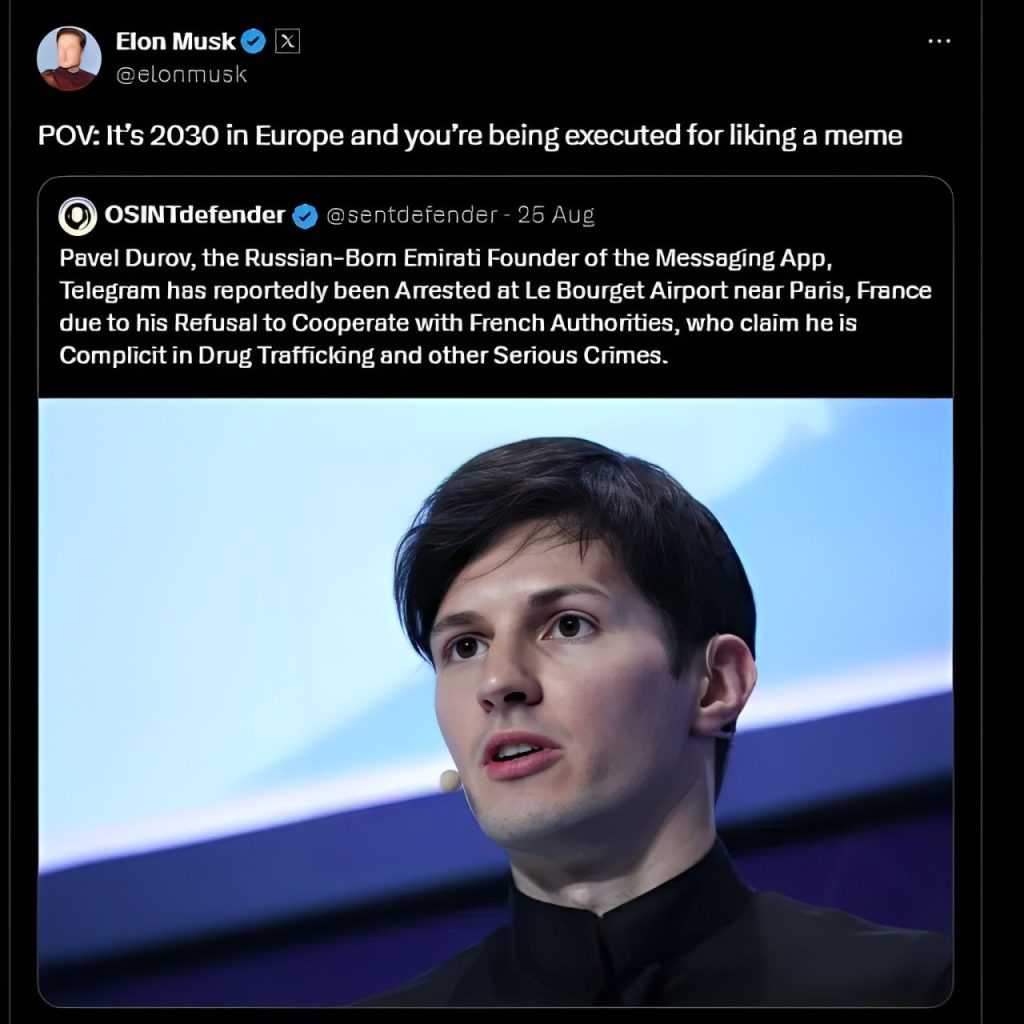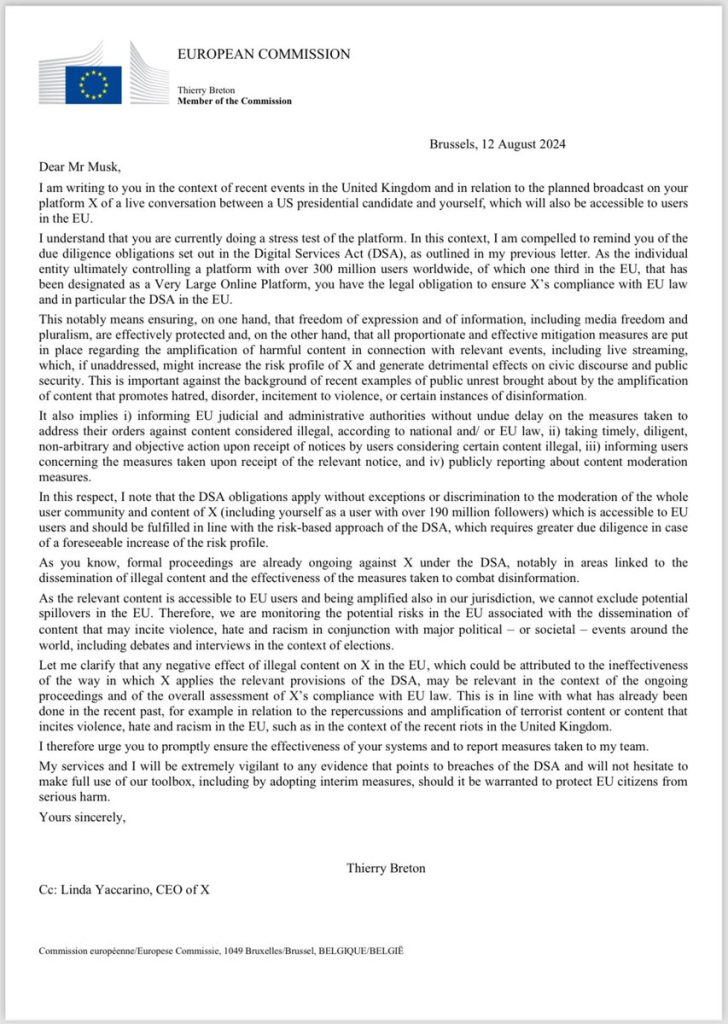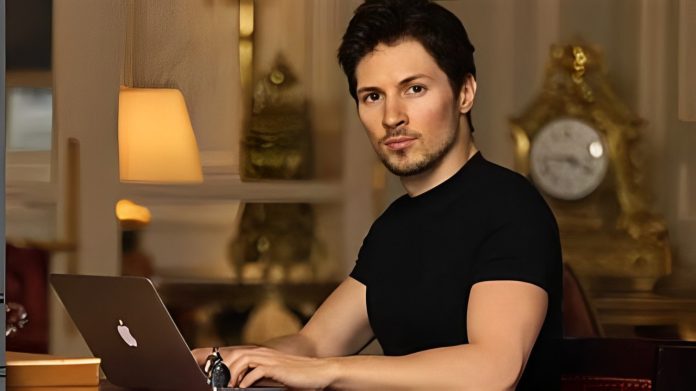Is he a free speech martyr? Or child pornography, organised crime and terrorism profitee
The arrest of Pavel Durov – the CEO and founder of social media app Telegram – in France last weekend has triggered an explosive debate over what constitutes freedom of expression – and crime.
The Russian-born tech entrepreneur was detained when his private luxury jet landed at Le Bourget airport, just outside Paris.
He has since been served with 12 charges relating to “complicity in managing an online platform to allow illicit transactions by an organised group”.
The big question is – which one?
Telegram is embroiled in claims of facilitating the distribution of disinformation and propaganda. This extends to child sex abuse material, drug trafficking, fraud, organised crime – and terrorism.
Durov has brought the wrath of authorities down on himself by refusing to co-operate with investigators or comply with regulations or laws.
Free speech ideologues around the world have expressed outrage.
Online safety activists have expressed relief.
“POV: It’s 2030 in Europe and you’re being executed for liking a meme,” Musk posted shortly after the arrest.

Durov does not face the death penalty.
Nor do the charges against him relate to a meme.
But the case does have far-reaching implications for social media moguls worldwide.
Its outcomes could set a global precedent for content moderation standards, cross-jurisdiction enforcement – and executive accountability.
Amid it all is the former vice president of Twitter’s European office.
Bruce Daisley is calling for Musk to be arrested for inciting violence amid recent uproar over the knife murder of three girls in the UK.
“Musk and fellow executives should be reminded of their criminal liability for their actions under existing laws,” the ex-executive wrote in a column for British media.
A tall poppy falls
French prosecutors issued arrest warrants for Pavel Durov and his Telegram co-founder and brother Nikolai in March, according to documents reportedly seen by US news service Politico.
“The document indicates the French undercover investigation into Telegram is wider and began months earlier than previously known,” the report states.
The Paris public prosecutor’s office has said the arrest relates to “various offences committed via Telegram … [which] include child pornography offences (among others).”
Authorities accuse Telegram of “almost non-existent co-operation” with attempts to track down an offender.
As a result, Durov and his brother have been charged with “complicity in possessing, distributing, offering or making available pornographic images of minors, in an organised group.”
Durov was detained on a stopover after flying out of Azerbaijan.
Nikolai’s location is unknown.
“The only statement I’d wish to make is that Telegram is in conformity with every aspect of European norms on digital matters,” Durov’s lawyer David-Olivier Kaminski said.
“It is absurd to think that the head of a social network is being charged.”
Conviction can lead to a 10-year jail term, or an $A800,000 fine.
Durov, who holds French, Russian and Emirati citizenship, has since been released on bail and is forbidden from leaving France.
He had to post an $A8 million bond.
So why Durov? Why now?
“Durov’s unique background might go some way to suggest why he was taken in,” says University of Sydney media researcher Timothy Koskie.
“Unlike other major tech players, he lacks US citizenship. He hails from a country with a chequered past of internet activity – and a diminished diplomatic standing globally thanks to its war against Ukraine … Combined, these factors make him a more accessible target to test the enforcement of expanding regulatory frameworks.”
Telegraphing trouble
Pavel and Nikolai founded Telegram in 2013. It has since generated a user base of almost one billion accounts.

Is Pavel Durov a hero or villain?
It’s touted as a global platform of private discourse – a safe haven for political dissidents and unpopular views.
But its anonymity and perceived security have also proven popular for less noble purposes.
Telegram was instrumental in mobilising protests against Belarusian dictator Alexander Lukashenko’s false election results.
It was also a platform of choice among Islamic State terrorists seeking anonymity during their brutal insurrection in the Middle East.
Durov left Russia in 2014. He says this was because he refused to comply with demands to suppress the voices of opposition activists.
He’s since based himself in Berlin, London, Singapore, San Francisco – and now Dubai.
“(It’s) the best place for a neutral platform like ours to be in if we want to make sure we can defend our users’ privacy and freedom of speech,” Durov told controversial US commentator Tucker Carlson in a recent interview.
“I prefer to be free than to take orders from someone.”
His Telegram service makes a big deal about the ideal of free speech.
It refuses to take down posts.
It rejects orders to identify users hiding behind masks of anonymity.
And it shows little concern for the freedoms of victims of defamation, disinformation, exploitation, sexual abuse, organised crime – or terrorism.
In 2023, Facebook billionaire Mark Zuckerberg’s WhatsApp reported 1.3 million posts for alleged child pornography. Telegram reported none.
And its claims of being a secure, encrypted platform fall far short of the protections offered by its competitors.
One-to-one Telegram conversations can be encrypted (but are not by default). All larger group chats cannot be so protected. And records of these group chats of up to 200,000 users each remain stored on Telegram’s servers – the location of which it refuses to reveal.
X marks the spot
Musk, like Durov, faces growing claims that his social media platform X has become a safe haven for illegal content and behaviour. The self-proclaimed “free-speech absolutist” insists all forms of content moderation are just another name for censorship.
Musk, like Durov, is being targeted by the European Union for refusing to comply with their standards and laws.

Unlike Durov, Musk’s X service is covered by European Union law as it is classified as a “Very Large Online Platform”. Telegram has a smaller user base in the EU. So, individual nations are free to target it.
This is why Musk is unlikely to be “plucked off a private airport tarmac”, states Politico. “The most unpleasant thing he’s had to endure so far is a stern letter.”
But the controversial tycoon recently attacked Britain’s newly elected Prime Minister Keir Starmer for censoring false information and hate speech linked to riots across the country earlier in August.
Musk, who is more than happy to censor posts that he feels infringe upon his own personal freedom, accused Starmer of imprisoning people “who commit thought crimes”. He predicted “civil war” as a result.
The UK Prime Minister’s office refused to be drawn into a social media war.
But EU internal market chief Thierry Breton posted a formal letter to X, warning Musk that amplifying – and failing to mitigate – harmful content was a crime under his jurisdiction.
He added the EU was monitoring X over “potential risks in the EU associated with the dissemination of content that may incite violence, hate and racism”.
It’s an ongoing debate: Is the person using tech to blame? Or should the tech producer share in that responsibility?
Television, radio, newspaper, magazine, books and pamphlet publishers were long ago deemed jointly responsible for the messages they distributed – regardless of who wrote them.
Social media billionaires insist they’re not publishers and can’t be held accountable for what users distribute through them.
With great power comes …
Social media organisations – and their owners – are now openly political players.
“To take one example, both Google and Facebook took advantage of their central place in the information economy to advertise politically orientated content to resist the development and implementation of Australia’s News Media Bargaining Code,” writes Koskie.
“The platforms’ construction also directly influences what content can appear and what content is recommended – and hate speech can mark an opportunity for clicks and screen time.”
Australian Strategic Policy Institute (ASPI) senior analyst Dr Fitriani says Telegram’s lax oversight and desire to be associated with free speech has allowed it to become a tool for authoritarian governments and organised crime.
“To counter these threats, policymakers around the world must prioritise regulation, platform accountability and the promotion of alternative platforms that are less susceptible to misuse, while also protecting free speech,” Dr Fitriani writes.
“It’s a delicate balancing act.”
Dr Fitriani also disputes Telegram’s – and Durov’s – independence.
“Investments from figures such as Roman Abramovich and Sergey Solonin – both of whom are linked to the Russian government – raise significant concerns about the platform’s susceptibility to state influence.”

X owner Elon Musk has come out swinging in support of Durov.
And suspicions that Telegram’s servers are situated in Russia raise further national security concerns, in the same way TikTok’s Chinese origins do.
Durov’s arrest has sent shockwaves through the tech world.
French writer Voltaire coined the phrase, “With great power comes great responsibility”.
But what about accountability?
“(This case) could lay the groundwork for France to take wider actions against not only tech platforms, but also their owners. It could also embolden nations around the world – in the West and beyond – to undertake their own investigations,” says Koskie.
“In turn, it may also make tech platforms think far more seriously about the criminal content they host.”
Ex-Twitter executive Daisley is keen for this to happen.
He says Musk should be made an example of for his widely broadcasted rants, inflammatory comments and amplification of disinformation.
“In my experience, that threat of personal sanction is much more effective on executives than the risk of corporate fines,” he writes.
“Were Musk to continue stirring up unrest, an arrest warrant for him might produce fireworks from his fingertips, but as an international jetsetter, it would have the effect of focusing his mind.”
Source: News.com.au


